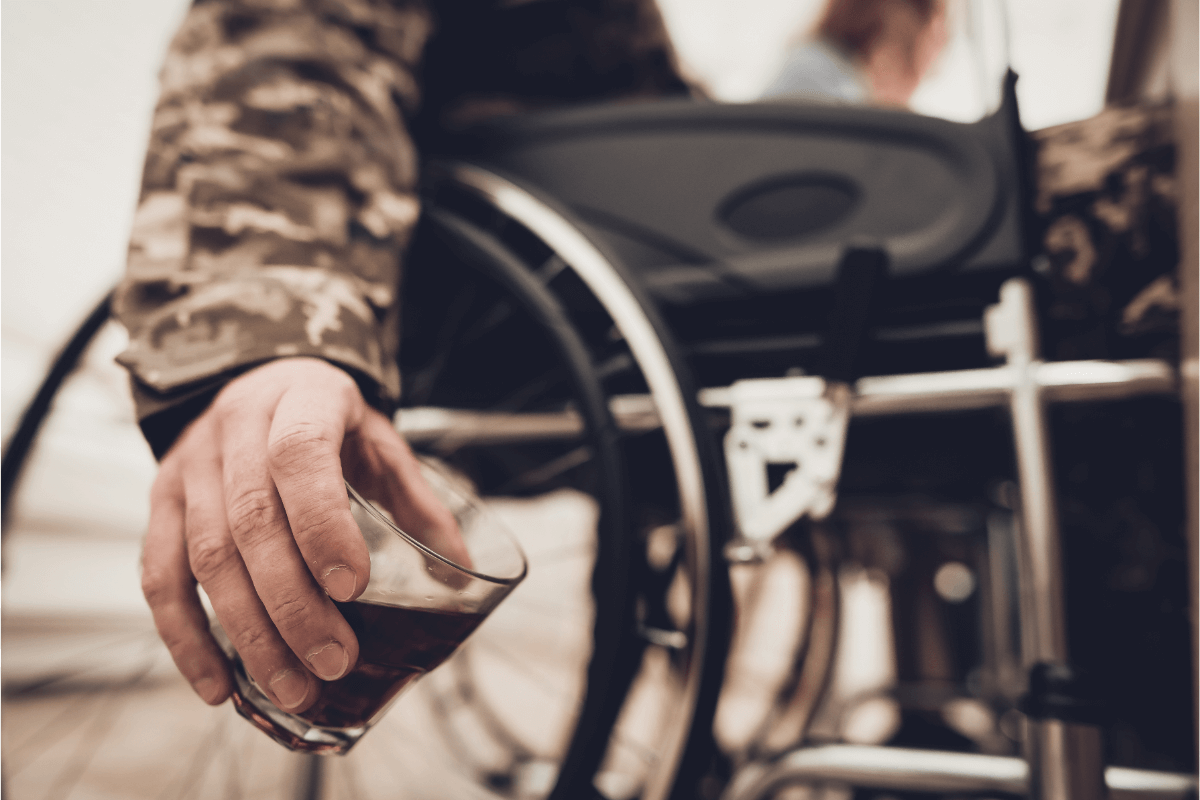
Understanding Veteran Alcoholism and Relapses
Over 10% of veterans meet the criteria for substance use disorders, with alcohol being one of the most problematic substances they face.[1] Alcohol abuse typically begins while a veteran is still serving, but the problem can get much worse when they return home. If you or a loved one is facing veteran alcoholism issues, understanding the illness and what can trigger a relapse is vital.
Development of a Disorder: Risk Factors Veterans Face
Veterans are more likely to experience problems with alcohol and other substances and struggle with relapses when they do get sober. But why?[1] A combination of risk factors plays a role in the development of alcohol addiction and in whether you can maintain long-term sobriety.
Military personnel experience unique stressors that can increase the risk of heavy drinking. Crucially, they’re exposed to traumatic events during combat, leading to the potential development of post-traumatic stress disorder (PTSD).
PTSD is the most common mental health condition that veterans face when they return home. At some point in their lives, seven out of every 100 veterans will experience PTSD, which produces symptoms such as the following:[2]
- Avoiding reminders of the trauma
- Having flashbacks or nightmares
- Being easily startled
- Being more on edge
- Isolating from loved ones
To cope with the distress that mental illness causes, many veterans turn to alcohol abuse. Although it can appear to help ease symptoms, alcohol makes them worse in the long run because of the way substance abuse changes brain chemistry.
To be able to maintain sobriety, it’s essential to treat both PTSD and alcohol abuse in a program designed for veterans. However, it can be challenging for veterans to search for help. There’s a stigma associated with both of these conditions, and the military environment is not conducive to asking for help.
Often, veterans begin facing mental health issues while on active duty but don’t want to put their careers at risk by admitting they’re struggling. Even when they return to civilian life, they may worry about appearing “weak” in front of their families.
The high-stress levels that military personnel experience day after day also cause significant damage. It can often seem like the only way to relax is to have a drink, creating a habit that can quickly escalate.
Veteran Alcoholism: Why Relapses Happen
Veterans who do get help for alcohol abuse can still struggle with relapses. Veterans often face unique challenges, like overwhelming PTSD symptoms, along with the classic stressors that people with substance use disorders experience, such as cravings, stress, and lack of social support.
It can be challenging for veterans to adjust to civilian life after service, too, leading them to isolate. This usually causes higher stress levels, putting them at risk of relapsing.
Chronic pain is another serious issue that can lead to relapses. Veterans who’ve suffered injuries that leave them with disabilities or pain might turn to alcohol for relief. If they experience flare-ups of pain, they could turn back to alcohol to cope — even if they’ve been sober for years.
Strategies for Preventing Relapses
Although relapsing doesn’t mean that recovery has failed, it can deal a blow to your self-confidence and potentially send you into further struggles with mental health. That’s why it’s so crucial to find ways of preventing relapses.
Having a strong support system is one of the most important steps you can take toward helping yourself remain sober. You need to know there are people you can turn to if you struggle. They can be family, friends, or people you get to know in 12-step programs.
Adding mindfulness and relaxation exercises into your daily life is vital. Mindfulness is particularly helpful for veterans struggling with PTSD because it allows you to stay in the present so that you can get symptoms under control.
Engaging in hobbies and activities you enjoy is also helpful. They allow you to express yourself while relieving stress. If you can do these activities with others, you can expect even more benefits from the social interactions.
Getting Help at Silver Sands Recovery for Veteran Alcoholism
You don’t have to battle with an alcohol use disorder on your own. By turning to the team at Silver Sands Recovery, you have access to several program options, including dual-diagnosis treatment, that can help you if you have co-occurring mental health conditions.
Don’t wait to get the help you deserve. Contact Silver Sands Recovery to speak with one of our experts.
Sources:
[1] https://nida.nih.gov/publications/drugfacts/substance-use-military-life
[2] https://www.ptsd.va.gov/understand/common/common_veterans.asp
About the author:

Lisa Waknin is the Founder and Director of Silver Sands Recovery, located in Prescott, Arizona. Lisa started Silver Sands Recovery after immersing herself in the addiction treatment world for several years to figure out what could be done differently to help her daughter and others like her to overcome addiction and stay sober. She believes in a hands-on treatment approach, which includes taking someone out of their environment, providing a 90-day program in a structured environment. During treatment, clients not only recover physically but also learn to live their life again. Lisa is a sought-after expert speaker for recovery support groups, charities, schools, communities, and companies wanting to educate themselves on the explosion of opiate and heroin abuse in our country and the best way to understand, treat, and beat it.




